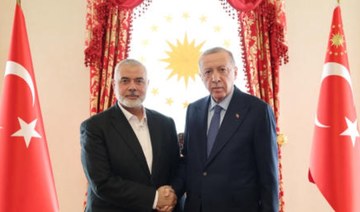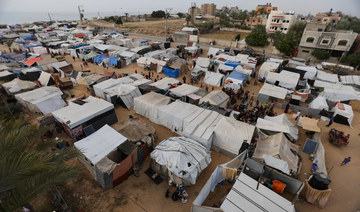ROME: Italy reported a 45% one-day increase in people infected with the coronavirus as other countries in Europe recorded their first cases Tuesday, producing evidence that travelers are carrying the virus from the European outbreak’s current epicenter.
Italian officials reported 11 deaths and 322 confirmed cases of the virus, 100 more than a day earlier. While the majority were concentrated in northern Italy, some of the new cases showed up in parts of Italy well outside the country’s two hard-hit regions, including three in Sicily, two in Tuscany and one in Liguria.
An Italian couple from the afflicted north tested positive in the Canary Islands off Africa, forcing the quarantine of their hotel in what one guest said felt like being “monkeys in a cage.” Austria, Croatia and Switzerland reported their first cases, all in people who recently traveled to Italy.
The four new deaths in Italy, like the seven reported earlier, were in patients who were elderly, suffering from other ailments, or both, officials said.
Italian Premier Giuseppe Conte defended the measures Italy has taken to contain the outbreak and predicted a stabilizing of numbers soon. But he acknowledged that the rise in cases — the most outside Asia — was “worrisome.”
“Obviously I can’t say I’m not worried because I don’t want anyone to think we’re underestimating this emergency,” he said before a meeting with a visiting World Health Organization mission. “But we trust that with the measures we’ve implemented there will be a containing effect in the coming days.”
Italy has closed schools, museums and theaters in the two regions where clusters have formed and troops are enforcing quarantines around 10 towns in Lombardy and the epicenter of the Veneto cluster, Vo’Euganeo.
But Italy hasn’t yet identified the source of the outbreak. Angelo Borrelli, the head of the Italian civil protection department, said the increase in cases from 222 to 322, representing a 45% increase, came from people who tested positive for the virus in a 24-hour period from Monday evening to Tuesday evening.
The southern island of Sicily reported its first three positive cases from a woman vacationing from Bergamo, in Lombardy and two others traveling with her. Two cases were also reported in Tuscany, south out of the epicenter.
Spain counted three active cases: a woman in Barcelona who had been in Lombardy in recent days, and a doctor from northern Italy and his partner who were vacationing in Tenerife, in the Canary Islands.
The hotel where the couple was staying, the H10 Adeje Palace was locked down after they tested positive for the virus and 1,000 tourists prevented from leaving, according to Spanish news media and town officials in Adeje.
“We do remain patient but we haven’t had anything to eat and drink at the hotel today,” Harriet Strandvik, the mother in a family of four stuck at the hotel, told Finnish newspaper Ilta-Sanomat. “We feel a little bit like monkeys in a cage here as there are media representatives present near the hotel and police officers guarding the area are wearing masks.”
The Canary Islands, an archipelago located around 100 kilometers (60 miles) west of the African coast, is a popular vacation destination that attracts Europeans year-round. Many Italians are vacationing this week as schools have a mid-winter break.
Conte shocked Lombardy officials by taking to task the hospital in Codogno, southeast of Milan, where Italy’s first positive patient went on Feb. 18 with flu-like symptoms. The man was sent home, only to return a short time later with worsening conditions, at which point he was tested for the virus.
Many of Lombardy’s 200-plus positive tests have a traceable connection to the Codogno hospital, including several doctors and nurses, patients and relatives who visited them.
Conte told reporters that the Lombardy cluster grew “because of the hospital management that wasn’t completely proper according to the protocols that are recommended for these cases.”
“This surely contributed to the spread,” he said.
Lombardy’s chief health official, Giulio Gallera, expressed shock at Conte’s remarks and defended the region’s handling of the crisis.
“It’s offensive. It’s unacceptable,” Gallera said, noting that the man presented none of the main risk factors for the virus — travel to China or contact with an infected person — when he first went to the emergency room.
The man was eventually tested after doctors ascertained from his wife that he had met with someone who had recently returned from China. But officials have excluded that contact as the source of the outbreak since that person tested negative.
As officials worked to get ahead of the spread nationally, the reality of a two-week quarantine was setting in for residents of Italy’s isolated “red zones” — the cluster of 10 towns in Lombardy and Veneto’s tiny Vo’Euganeo.
“The concern is palpable, people are worried, partly because of what they hear on television, information, on social media,” said Davide Passerini, the mayor of Fombio, one of the Lombardy towns under lockdown. “Life is like it is in other isolated villages: Everything is shut, people go out just to do their shopping.”
And they wait to see if they develop symptoms.
Italy initially tested anyone who came into contact with an infected person. But with the numbers growing and supply issues with test kits, masks and protective gear, Italy’s national health system revised its containment strategies.
People who live or have visited the quarantined areas, or who who have been in contact with positive cases, are advised to self-quarantine for two weeks. They are instructed to take their temperatures twice a day, and stay in touch with their doctors or the national health service via an overwhelmed toll-free number.
Only if they develop symptoms are they tested, most often by a team performing house calls to prevent hospitals and clinics being overly stressed, said Elia Delmiglio, mayor of Casalpusterlengo, another of the 10 towns in Lombardy’s “red zone.”
“Local health structures are doing their best, but in some cases they were not ready to face such an emergency,” Delmiglio said.
The town — with more than 15,000 inhabitants — doesn’t have a working emergency room, only a hospital mainly specializing in cancer patients, who are particularly at risk for contracting the virus.
In another hotbed of the virus outbreak — Veneto’s tiny town of Vo’Euganeo, which has most of Veneto’s 43 cases — local authorities were still planning to test all 3,300 residents and 600 acting hospital staff.
“I’m being optimistic and I feel well,” said resident Andrea Casalis, as he waited to be tested. “People continue to go out here and talk in the streets, but we try to keep some security distance.”
Tuesday sees Italy virus cases rise 45%; 11 dead
https://arab.news/g2edd
Tuesday sees Italy virus cases rise 45%; 11 dead
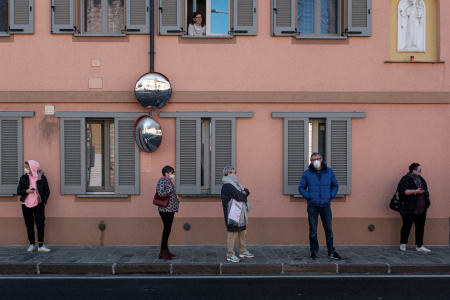
- Infections in other European countries traced to people who had recently travelled to Italy
- The country has the most confirmed cases in Europe
China to host Hamas, Fatah for Palestinian unity talks
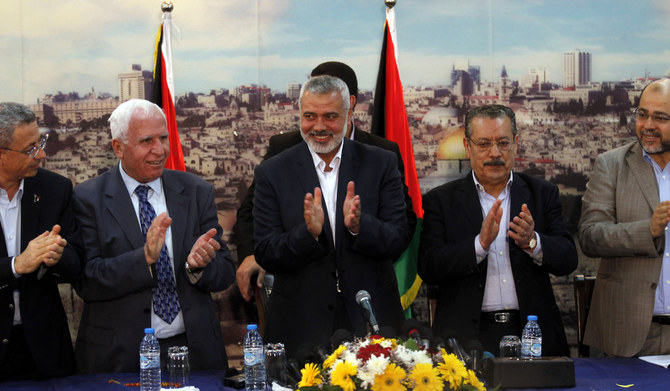
- Israel has killed more than 34,000 Palestinians, according to Gaza’s Health Ministry
BEIJING/CAIRO: China will host Palestinian unity talks between Islamist militant group Hamas and its rivals Fatah, the two groups and a Beijing-based diplomat said on Friday, a notable Chinese foray into Palestinian diplomacy amid the war in the Gaza Strip.
Hamas, which controls Gaza, is the group whose fighters stormed into Israeli towns on Oct. 7, killing 1,200 people and capturing 253 hostages. Israel has sworn to annihilate Hamas in an onslaught that has killed more than 34,000 Palestinians.
Fatah is the movement of Mahmoud Abbas, president of the Western-backed Palestinian Authority, which exercises limited self-rule in the Israeli occupied West Bank.
The two rival Palestinian factions have failed to heal their political disputes since Hamas fighters expelled Fatah from Gaza in a short war in 2007. Washington is wary of moves to reconcile the two groups, as it supports the PA but has banned Hamas as terrorists.
A Fatah official told Reuters a delegation, led by the group’s senior official Azzam Al-Ahmed, had left for China. A Hamas official said the faction’s team for the talks, led by senior Hamas official Moussa Abu Marzouk, would be flying there later on Friday.
“We support strengthening the authority of the Palestinian National Authority, and support all Palestinian factions in achieving reconciliation and increasing solidarity through dialogue and consultation,” said Chinese Foreign Ministry spokesperson Wang Wenbin at a regular briefing on Friday, without confirming the meeting.
The visit will be the first time a Hamas delegation is publicly known to have gone to China since the start of the war in Gaza. A Chinese diplomat, Wang Kejian, met Hamas chief Ismail Haniyeh in Qatar last month, according to the Chinese foreign ministry.
The Beijing-based diplomat, who had been briefed on the matter, said the talks aimed to support efforts to reconcile the two Palestinian rival groups.
China has lately demonstrated growing diplomatic influence in the Middle East, where it enjoys strong ties with Arab nations and Iran. Last year, Beijing brokered a breakthrough peace deal between longstanding regional foes Saudi Arabia and Iran.
US Secretary of State Antony Blinken said he discussed with Chinese President Xi Jinping and other officials in Beijing on Friday how China can play a constructive role in global crises, including the Middle East.
Chinese officials have ramped up advocacy for the Palestinians in international forums in recent months, calling for a larger-scale Israeli-Palestinian peace conference and a specific timetable to implement a two-state solution.
In February, Beijing urged the International Court of Justice (ICJ) to give its opinion on the Israeli occupation of the Palestinian Territories, which it said was illegal.
More recently, China has been pushing for Palestine to join the United Nations, which Beijing’s top diplomat Wang Yi said last week would “rectify a prolonged historical injustice.” (Reporting by Nidal Al-Mughrabi and Laurie Chen in Beijing Additional reporting by Ali Sawafta in Ramallah Writing by Nidal Al-Mughrabi Editing by Peter Graff)
Somalia detains US-trained commandos over theft of rations
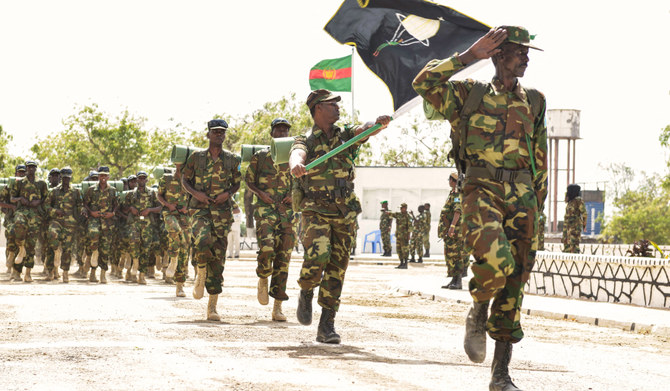
- The US agreed in 2017 to help train and equip the 3,000-strong Danab to act as a quick-reaction strike force against Al-Shabab
MOGADISHU: Somalia’s government said it had suspended and detained several members of an elite, US-trained commando unit for stealing rations donated by the US, adding that it was taking over responsibility for provisioning the force.
The Danab unit has been a key pillar of US-backed efforts to combat the Al-Qaeda-linked militant group Al-Shabab. The US agreed in February to spend more than $100 million to build up to five military bases for Danab.
Somalia’s Defense Ministry said in a statement that it had notified international partners of the theft and would share the outcome of its investigation.
A US official said in a statement to Reuters that Washington takes all corruption accusations seriously.
“We look forward to engaging with the Danab on creating the necessary safeguards and accountability measures to prevent future incidents that could affect future assistance,” the official said, without directly addressing whether any US support had already been suspended.
The US agreed in 2017 to help train and equip the 3,000-strong Danab to act as a quick-reaction strike force against Al-Shabab.
The group has been waging an insurgency against the central government since 2006.
Danab has been heavily involved in a military offensive by the Somali military and allied clan militias since 2022 that initially succeeded in wresting swaths of territory from Al-Shabab in central Somalia.
However, the campaign has lost momentum, with the government-allied forces struggling to hold rural areas and Al-Shabab continuing to stage large-scale attacks, including in the capital Mogadishu.
Washington suspended some defense assistance to Somalia in 2017 after the military could not account for food and fuel.
The US also conducts frequent drone strikes targeting Al-Shabab militants.
Kenya flood death toll since March climbs to 70

- Tanzania Prime Minister Kassim Majaliwa said on Thursday that more than 200,000 people had been affected by the disaster, with 155 fatalities and 236 people injured
NAIROBI: The number of people killed in floods in Kenya due to heavier than usual rainfall since the start of the monsoon in March has risen to 70, a government spokesperson said on Friday.
In recent weeks, Kenya and other countries in East Africa — a region highly vulnerable to climate change — have been pounded by heavier-than-usual rainfall compounded by the El Nino weather pattern.
El Nino is a naturally occurring climate pattern typically associated with increased heat worldwide, leading to drought in some parts of the world and heavy rains elsewhere.
BACKGROUND
Kenyans have been warned to stay on alert, with the forecast for more heavy rains across the country in the coming days as the monsoon batters East Africa.
“The official tally of fellow Kenyans who regrettably have lost their lives due to the flooding situation now stands at 70 lives,” government spokesperson Isaac Mwaura said on X after torrential rains killed more than a dozen people in the capital, Nairobi, this week.
Mwaura said the government would issue a “comprehensive brief” following a meeting with the national emergency response committee after the extreme weather caused chaos across Nairobi this week, blocking roads and engulfing homes in slum districts. Kenyans have been warned to stay on alert, with the forecast for more heavy rains across the country in the coming days as the monsoon batters East Africa.
At least 155 people have died in neighboring Tanzania due to flooding and landslides.
Tanzania Prime Minister Kassim Majaliwa said on Thursday that more than 200,000 people had been affected by the disaster, with 155 fatalities and 236 people injured.
He said homes, property, crops, and infrastructure such as roads, bridges, railways, and schools had been damaged or destroyed.
In Burundi, one of the poorest countries on the planet, around 96,000 people have been displaced by months of relentless rains, the United Nations and the government said this month.
Meanwhile, the UN humanitarian response agency, OCHA, said in an update this week that in Somalia, the seasonal Gu rains from April to June are intensifying, with flash floods reported since April 19.
It said four people had been reportedly killed and more than 800 people affected or displaced nationwide.
Uganda has also suffered heavy storms that have caused riverbanks to burst, with two fatalities confirmed and several hundred villagers displaced.
Late last year, more than 300 people died in torrential rains and floods in Kenya, Somalia, and Ethiopia, just as the region was trying to recover from its worst drought in four decades that left millions of people hungry.
From October 1997 to January 1998, massive flooding caused more than 6,000 deaths in five countries in the region.
Jewish campaign group led by Gideon Falter cancels London march over safety concerns

- The Campaign Against Antisemitism says safety concerns forced it to call off its “Walk Together” march after receiving threats from ‘hostile actors’
- Last weekend, a video appeared to show police prevent ‘openly Jewish’ Falter from walking near a pro-Palestine protest but a longer version of the footage painted a different picture
LONDON: The organizers of a march in protest against antisemitism, planned for Saturday in London, “reluctantly” announced on Friday that they were canceling the demonstration.
The Campaign Against Antisemitism said it was forced by safety concerns to call off its “Walk Together” march, which was scheduled to coincide with the latest in a series of pro-Palestine marches in the British capital. The organization said it had expected thousands of people to take part but threats from “hostile actors” posed a safety risk.
“We have received numerous threats and our monitoring has identified hostile actors who seem to have intended to come to any meeting locations that we announced,” the CAA said.
“The risk to the safety of those who wished to walk openly as Jews in London tomorrow as part of this initiative has therefore become too great.
“We are no less angry about these marches than our Jewish community and its allies. We want to walk.”
The group added that it wants the Metropolitan Police not only to “manage marches” but “police” them.
Last weekend, a video that circulated on social media sparked controversy as it showed a confrontation between the CAA’s chief executive, Gideon Falter, and a Metropolitan Police officer who appeared to be preventing him from crossing the road in the vicinity of a pro-Palestine march in London because he was “openly Jewish” and his presence was “antagonizing.”
Falter, who was threatened with arrest if he did not leave the area, criticized the police for their actions during the incident and claimed there were now “no-go zones for Jews” in London amid a rise in antisemitic sentiment arising from Israel’s war on Gaza following the Oct. 7 attacks by Hamas.
Police chiefs apologized twice for the officer’s choice of words. However, a former senior police officer said on Monday that the initial, short version of the video most people saw online “did not fully represent the situation.”
A longer version showed the officer expressing concern about Falter’s actions because he appeared to be deliberately attempting to provoke the pro-Palestinian demonstrators.
Berlin police clear pro-Palestinian camp from parliament lawn

- Police dismantled tents, forcibly removed protesters and blocked the surrounding area to stop others arriving
- "The idea was to draw attention to that and ... to the German complicity and active enabling of the Israeli genocide in Gaza," the camp organizer, Jara Nassar, said
BERLIN: Berlin police on Friday began clearing a pro-Palestinian camp set up in front of the German parliament by activists demanding the government stop arms exports to Israel and end what they say is the criminalization of the Palestinian solidarity movement.
Police dismantled tents, forcibly removed protesters and blocked the surrounding area to stop others arriving.
The action followed clashes between demonstrators and police on US campuses and a blockade at Paris’s Sciences Po university, part of international protests to decry Israel’s military campaign in Gaza and Western support for Israel.
The Berlin camp ‘Besetzung Gegen Besatzung’ — ‘Occupy Against Occupation’ — began on April 8, coinciding with the start of International Court of Justice hearings in Nicaragua’s case against Germany for providing military aid to Israel.
“The idea was to draw attention to that and ... to the German complicity and active enabling of the Israeli genocide in Gaza,” the camp organizer, Jara Nassar, told Reuters.
Israel strongly denies accusations that its offensive in Gaza, which aims to destroy the Palestinian militant group Hamas, constitutes a genocide.
Nassar and a dozen protesters sat on the ground, chanting pro-Palestinian slogans and songs as police with loudspeakers called on them to leave.
“We look at what is happening in the US ... with admiration. There is no reason to believe we should stop now,” said Udi Raz, a PhD student at Berlin’s Free University and a member of the Jewish Voice association.
Raz, who wore a Jewish kippah with the Palestinian flag colors and held his phone in a live social media broadcast of the clearance, said Jewish activists had joined the camp and held a candle-lit Passover dinner there this week.
Police said the prohibition order for the camp, which had been granted authorization at the start of the protest, was due to repeated violations committed by some protesters, including the use of unconstitutional symbols and forbidden slogans.
“Protection of gatherings cannot be guaranteed at this point because public safety and order are significantly at risk,” police spokesperson Anja Dierschkesaid said, adding tents had to be moved daily under local regulations to maintain the lawn.
“For the German government, grass matters more than the lives of more than 40,000 innocent people in Gaza murdered by the Israeli military,” Raz said.





